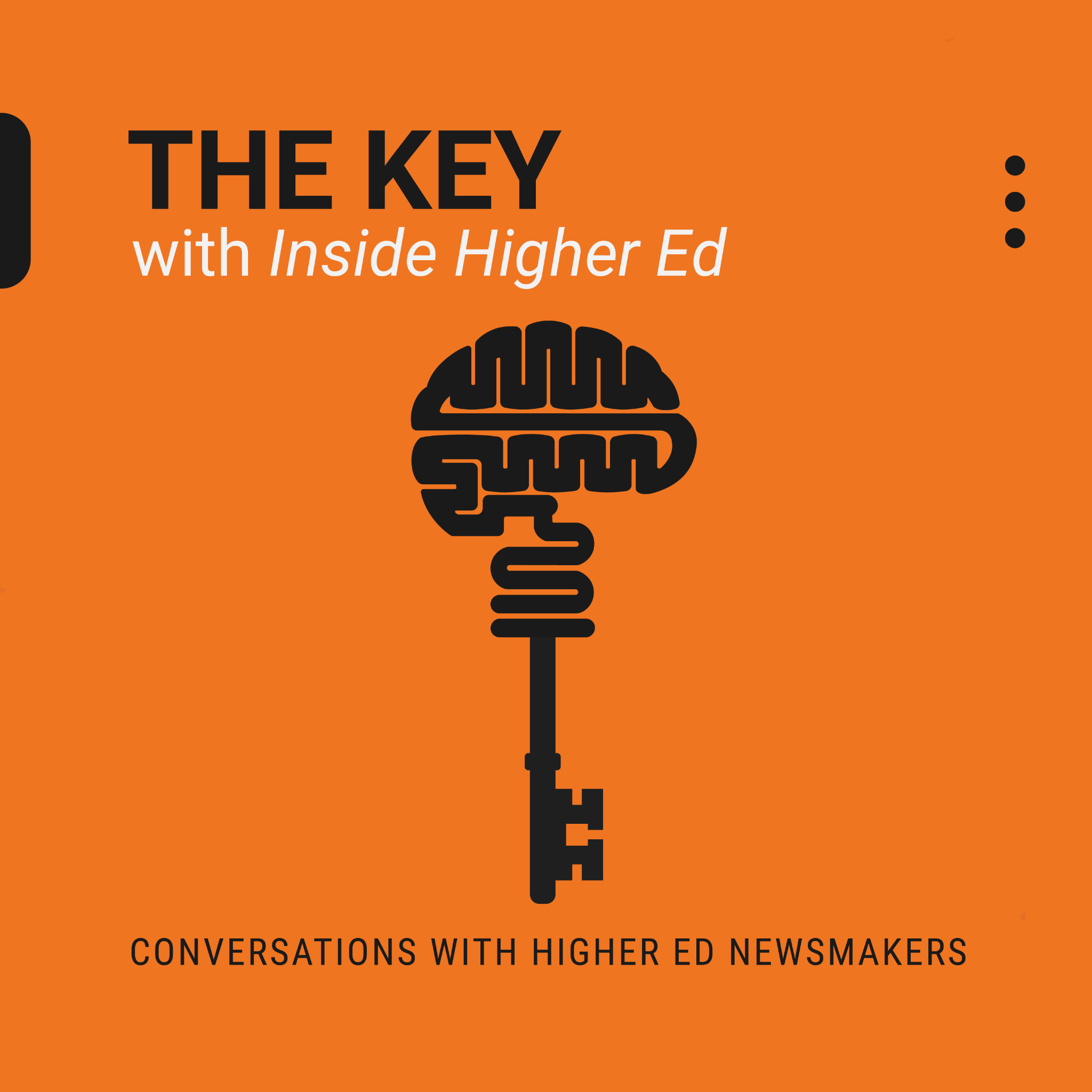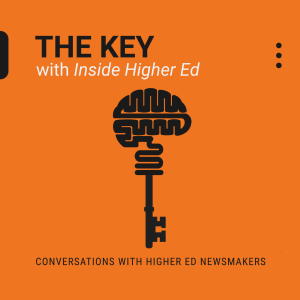
Hear candid conversations with higher-ed newsmakers. Hosted by Inside Higher Ed. Inside Higher Ed is the leading source for the latest news, analysis, and services for the entire US higher education community.
Hear candid conversations with higher-ed newsmakers. Hosted by Inside Higher Ed. Inside Higher Ed is the leading source for the latest news, analysis, and services for the entire US higher education community.
Episodes

Thursday Jun 20, 2024
Ep. 118: Colleges’ Responsiveness to the Job Market
Thursday Jun 20, 2024
Thursday Jun 20, 2024
Colleges are increasingly being judged by how well they prepare students for jobs and careers after they leave, and in response most are trying to adapt their programs and offerings to align with the needs of employers. How are they doing?
This week's episode of The Key uses two recent studies (from Georgetown University’s Center on Education and the Workforce and from the Upjohn Institute) as a jumping-off point for a larger conversation about how colleges and universities are responding to the growing pressure to prepare learners for work.
Our guest is Michelle Van Noy, an associate research professor and director of the Education and Employment Research Center at Rutgers University New Brunswick. In a wide-ranging conversation, she discusses the complex set of factors that make easy answers hard to come by in this realm, the differing expectations of different types of institutions, the roles that employers and learners themselves have as well as institutions, and the emergence of skills-based hiring, among other topics.
The Key is hosted by Inside Higher Ed Co-founder and Editor Doug Lederman. This episode is sponsored by the Gates Foundation.

Wednesday Jun 12, 2024
Ep. 117: Voices Of Student Success: Counting Student Parents
Wednesday Jun 12, 2024
Wednesday Jun 12, 2024
National estimates find around one in five students have dependents, but few colleges and universities have accurate numbers of who their parenting students are and what their circumstances may be. Student parents are faced with additional financial stress and time constraints compared to their non-parenting peers, so how can higher ed leaders find these parents and better serve them?
In this episode, hear from Eddy Conroy, and Da'Shon Carr from the think tank New America to learn about their Student Parent Initiative and federal policy movement on student parent data, and Ray Murrilo, interim vice chancellor for student affairs, belonging and equity at the California State University Chancellor’s office, to discuss state legislation that provides priority registration for student parents at the CSU.
Hosted by Inside Higher Ed Student Success Reporter Ashley Mowreader.
Read a transcript of the podcast here.

Wednesday Jun 05, 2024
Ep. 116: Provosts' Perspectives on Generative AI, Tenure and Academic Program Cuts
Wednesday Jun 05, 2024
Wednesday Jun 05, 2024
Colleges and universities are undergoing intense pressure from a lot of angles – and their provosts are arguably at the epicenter of most of them.
A new episode of The Key, Inside Higher Ed’s news and analysis podcast, explores our 2024 Survey of College and University Chief Academic Officers and topics such as the future of tenure, cost-cutting around academic programs, and the potential impact of generative artificial intelligence.
Joining the discussion are Colleen Flaherty, Inside Higher Ed's special content editor, and Ryan Quinn, Inside Higher Ed's faculty issues reporter, who together have reported on the faculty and academic issues for a dozen years.
The Key is hosted by Inside Higher Ed Co-founder and Editor Doug Lederman. This episode is sponsored by Interfolio from Elsevier.

Friday May 31, 2024
Ep. 115: FAFSA, Affordability and Financial Aid’s Future
Friday May 31, 2024
Friday May 31, 2024
The last year has been a hellish one for many college financial aid directors – and, not surprisingly, for the head of the National Association of Student Financial Aid Administrators, who’s leaving his role after 14 years.
This episode of The Key features a conversation with Justin Draeger, who recently announced that he would soon wrap up his work as president and CEO of NASFAA for a new role leading Strada Education’s efforts to make higher education more affordable.
In the conversation, he discusses the impact of the FAFSA mess, possible approaches to make college more affordable, and the state of the financial aid workforce, among other topics.
The Key is hosted by Inside Higher Ed Co-founder and Editor Doug Lederman. This episode is sponsored by Mongoose.

Wednesday May 22, 2024
Ep. 114: Generative AI's Potential Influence on Teaching and Learning
Wednesday May 22, 2024
Wednesday May 22, 2024
Discussions about the impact of generative artificial intelligence in teaching and learning are steadily moving beyond questions about whether and how students will cheat.
Today’s episode of The Key is drawn from a workshop expertly led by Inside Higher Ed’s Colleen Flaherty at the Digital Universities U.S. conference at Washington University in St. Louis.
The conversation on “Teaching with Generative AI: Benefits and Risks” featured four thoughtful experts on teaching and learning: Asim Ali, executive director of the Biggio Center for the Enhancement of Teaching and Learning at Auburn University; Trey Conatser, director of the Center for the Enhancement of Learning and Teaching at the University of Kentucky; Emily Thompson, director of online programs at Washington University’s School of Medicine, and Michael Reese, associate dean at Johns Hopkins University’s Center for Teaching Excellence and Innovation.
You’ll hear precious little discussion about cheating, but a lot of talk about the need for faculty training and support and the importance of bridging potential gaps in access and overcoming bias in the technology, among other things.
The Key is hosted by Inside Higher Ed Co-founder and Editor Doug Lederman. This episode is sponsored by Mongoose.

Tuesday May 14, 2024
Ep. 113: Helping Higher Education Own Its AI Future
Tuesday May 14, 2024
Tuesday May 14, 2024
How Arizona State University is working with Open AI to shape the development of generative AI.
This week’s episode of The Key explores the recently announced partnership between Arizona State University and Open AI – one major way colleges and universities are trying to make sure higher education isn’t left behind in generative AI’s development.
The conversation that follows was drawn from a session last week at the Digital Universities U.S. conference that Inside Higher Ed put on with our partner Times Higher Education.
It features Lev Gonick, the enterprise chief information officer at Arizona State, talking with Inside Higher Ed editor Doug Lederman about the university’s goals in its partnership with Open AI, how ASU and other institutions hope to influence the development of generative AI, and how other colleges might be thinking about their own AI futures.
The Key is hosted by Inside Higher Ed Co-founder and Editor Doug Lederman. This episode is sponsored by Mongoose.

Wednesday May 01, 2024
Ep. 112: How Should We Measure Post-College Outcomes?
Wednesday May 01, 2024
Wednesday May 01, 2024
Zakiya Ellis, a longtime policy expert, on whether we’re asking the right questions and have the right data.
This weeks’s episode of The Key podcast explores a vexing question: how might policy makers and college leaders go about showing that getting a postsecondary education pays off for later in life?
The episode features a conversation with Zakiya Smith Ellis, a principal at the education policy consulting firm Education Counsel and former senior Obama education aide and secretary of education in New Jersey.
Ellis shares her thoughts on how we’ve gotten to the point where we are assessing college value primarily by looking at individuals’ financial outcomes, whether we’re asking the right questions about the benefits of college-going, and what institutional leaders should be doing to make sure their academic programs are serving students well.
The Key is hosted by Inside Higher Ed Co-founder and Editor Doug Lederman. This episode is sponsored by the Strada Education Foundation.

Tuesday Apr 23, 2024
Ep. 111: Stackable and Alternative Credentials Go Mainstream
Tuesday Apr 23, 2024
Tuesday Apr 23, 2024
This week’s episode of The Key explores whether the emergence of shorter-term and alternative credentials pose a threat -- or offer salvation – to traditional colleges and universities.
The episode draws from a panel discussion at last week’s annual ASU+GSV Summit involving a number of thoughtful higher ed leaders. It featured Ted Mitchell, president of the American Council on Education, President Marlene Tromp of Boise State University in Idaho, Ann Kirschner, interim president of Hunter College of the City University of New York, and Maria Anguiano, executive vice president for learning enterprise at Arizona State University.
The conversation explored whether or not colleges and universities will adapt their curriculums and their delivery models to supplement degrees with certificates and credentials, sustaining their historical advantage as the primary path for learners seeking career advancement and better futures.
The group was overall pretty bullish about higher education’s ability to adapt to the changing expectations of learners, but also clear-eyed about the fate of colleges that don’t: declining relevancy and, in some cases, extinction.
The Key is hosted by Inside Higher Ed Co-founder and Editor Doug Lederman. This episode is sponsored by the Strada Education Foundation.

Wednesday Apr 10, 2024
Ep. 110: Underemployment of College Graduates: How Concerned Should We Be?
Wednesday Apr 10, 2024
Wednesday Apr 10, 2024
Half of all graduates don’t work in jobs that require a bachelor’s degree. What can institutions do to best prepare their students for work?
More than half of bachelor’s degree holders are underemployed a year after graduation, and roughly four in 10 are still underemployed a full decade later. How worried should we be about those rates, and what can colleges and universities do to decrease them?
That question was at the heart of “Talent Disrupted,” a recent report from Strada Education Foundation and the Burning Glass Institute, which adds important nuance to the larger discussion about post-college outcomes for graduates.
In this episode, we dig into the report with two experts. Carlo Salerno is a managing director at the Burning Glass Institute and an author of the aforementioned report. Gary Daynes is founder and principal of Back Porch Consulting and a former professor and senior administrator at several private nonprofit colleges.
They discuss what underemployment means and how serious a problem it is, the conditions that contribute to it, and what colleges and universities can do to shield their graduates from it.
The Key is hosted by Inside Higher Ed Co-founder and Editor Doug Lederman. This episode is sponsored by the Strada Education Foundation.

Wednesday Apr 03, 2024
Ep. 109: Voices Of Student Success: Creating Community for Students in Recovery
Wednesday Apr 03, 2024
Wednesday Apr 03, 2024
Many students on college campuses struggle with substance use and abuse, but fewer have a supportive community they can turn to.
In this episode, Angela Lauer Chong, associate vice president for student affairs and dean of students at Florida State University speaks about supporting students’ physical and emotional health through LIFT, a collegiate recovery program.
Hosted by Inside Higher Ed Student Success Reporter Ashley Mowreader. This episode is sponsored by InsideTrack. Read a transcript of the podcast here.
